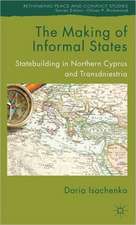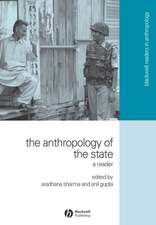Political Elites and Decentralization Reforms in the Post-Socialist Balkans: Regional Patronage Networks in Serbia and Croatia: New Perspectives on South-East Europe
Autor Alexander Kleibrinken Limba Engleză Hardback – 3 aug 2015
Din seria New Perspectives on South-East Europe
- 9%
 Preț: 628.07 lei
Preț: 628.07 lei - 15%
 Preț: 643.34 lei
Preț: 643.34 lei - 15%
 Preț: 646.11 lei
Preț: 646.11 lei - 15%
 Preț: 641.85 lei
Preț: 641.85 lei -
 Preț: 390.63 lei
Preț: 390.63 lei -
 Preț: 390.25 lei
Preț: 390.25 lei -
 Preț: 393.52 lei
Preț: 393.52 lei - 15%
 Preț: 642.51 lei
Preț: 642.51 lei - 15%
 Preț: 642.51 lei
Preț: 642.51 lei - 18%
 Preț: 895.56 lei
Preț: 895.56 lei - 18%
 Preț: 950.52 lei
Preț: 950.52 lei - 18%
 Preț: 729.53 lei
Preț: 729.53 lei - 18%
 Preț: 777.50 lei
Preț: 777.50 lei -
 Preț: 485.24 lei
Preț: 485.24 lei - 18%
 Preț: 789.52 lei
Preț: 789.52 lei - 18%
 Preț: 791.57 lei
Preț: 791.57 lei -
 Preț: 386.81 lei
Preț: 386.81 lei -
 Preț: 393.52 lei
Preț: 393.52 lei -
 Preț: 387.20 lei
Preț: 387.20 lei
Preț: 388.90 lei
Nou
Puncte Express: 583
Preț estimativ în valută:
74.41€ • 77.70$ • 61.59£
74.41€ • 77.70$ • 61.59£
Carte tipărită la comandă
Livrare economică 04-18 aprilie
Preluare comenzi: 021 569.72.76
Specificații
ISBN-13: 9781137495716
ISBN-10: 1137495715
Pagini: 231
Ilustrații: XVI, 231 p.
Dimensiuni: 140 x 216 x 16 mm
Greutate: 0.44 kg
Ediția:1st ed. 2015
Editura: Palgrave Macmillan UK
Colecția Palgrave Macmillan
Seria New Perspectives on South-East Europe
Locul publicării:London, United Kingdom
ISBN-10: 1137495715
Pagini: 231
Ilustrații: XVI, 231 p.
Dimensiuni: 140 x 216 x 16 mm
Greutate: 0.44 kg
Ediția:1st ed. 2015
Editura: Palgrave Macmillan UK
Colecția Palgrave Macmillan
Seria New Perspectives on South-East Europe
Locul publicării:London, United Kingdom
Cuprins
List of Figures and Tables
Foreword
List of Abbreviations
1. Centre-Periphery Relations in the Balkan
1.1. Problem definition and research question
1.2. Regional autonomy and decentralisation
1.3. The case studies: Serbia and Croatia in the context of former Yugoslavia
1.4. Research design, methodology and case selection
1.5. Outline of the book
2. A Framework for Studying Elite Access to Resources
2.1. Existing accounts of decentralisation
2.2. Resource dependency and elite agreements between centre and periphery
2.3. Conclusion
3. The Role of Institutional Legacies from Yugoslav Decentralisation
3.1. Pre-socialist legacies
3.2. Socialist legacies: Accommodation
3.3. Nationalist-authoritarian legacies from the 1990s: Confrontation
3.4. Conclusion
4. Access to Electoral Resources
4.1. Electoral resources in centre and periphery
4.2. The electoral systems in Serbia and Croatia
4.3. Access to electoral resources at regional and national level
4.4. Conclusion
5. Information Exchange and Cooperation
5.1. Centre-periphery relations during autonomy negotiations since 2000
5.2. Methodological note
5.3. Information exchange between centre and periphery
5.4. Strategic cooperation between centre and periphery
5.5. Conclusion
6. Access to Patronage Resources
6.1. Access to patronage resources as a causal mechanism
6.2. The extent of patronage in Serbia and Croatia
6.3. Methodological note
6.4. Expert survey results
6.5. The politicisation of state-owned enterprises and government funds
6.6. Conclusion
7. Conclusions
APPENDIX
ANNEX I: List of interviewees
ANNEX II: List of organisations for network analysis
ANNEX III: Descriptive statistics of expert survey
ANNEX IV: Timeline of decentralisation in Croatia (Istria) and Serbia (Vojvodina), 1990-2010
BIBLIOGRAPHY
INDEX
Foreword
List of Abbreviations
1. Centre-Periphery Relations in the Balkan
1.1. Problem definition and research question
1.2. Regional autonomy and decentralisation
1.3. The case studies: Serbia and Croatia in the context of former Yugoslavia
1.4. Research design, methodology and case selection
1.5. Outline of the book
2. A Framework for Studying Elite Access to Resources
2.1. Existing accounts of decentralisation
2.2. Resource dependency and elite agreements between centre and periphery
2.3. Conclusion
3. The Role of Institutional Legacies from Yugoslav Decentralisation
3.1. Pre-socialist legacies
3.2. Socialist legacies: Accommodation
3.3. Nationalist-authoritarian legacies from the 1990s: Confrontation
3.4. Conclusion
4. Access to Electoral Resources
4.1. Electoral resources in centre and periphery
4.2. The electoral systems in Serbia and Croatia
4.3. Access to electoral resources at regional and national level
4.4. Conclusion
5. Information Exchange and Cooperation
5.1. Centre-periphery relations during autonomy negotiations since 2000
5.2. Methodological note
5.3. Information exchange between centre and periphery
5.4. Strategic cooperation between centre and periphery
5.5. Conclusion
6. Access to Patronage Resources
6.1. Access to patronage resources as a causal mechanism
6.2. The extent of patronage in Serbia and Croatia
6.3. Methodological note
6.4. Expert survey results
6.5. The politicisation of state-owned enterprises and government funds
6.6. Conclusion
7. Conclusions
APPENDIX
ANNEX I: List of interviewees
ANNEX II: List of organisations for network analysis
ANNEX III: Descriptive statistics of expert survey
ANNEX IV: Timeline of decentralisation in Croatia (Istria) and Serbia (Vojvodina), 1990-2010
BIBLIOGRAPHY
INDEX
Recenzii
“The monograph is a useful and welcome work in several respects. It offers a fresh take on decentralisation studies, shifting away from ethnically-centred discussions on decentralisation … . the study is a refreshing and important one. The shift of focus towards the agency of the political elites, and in particular towards a resources-driven framework, is much needed; for anyone familiar with the region … .” (Tena Prelec, Europe-Asia Studies, Vol. 69 (6), 2017)
“There are several reasons to recommend Alexander Kleibrink’s Political Elites and Decentralization Reforms in the Post-Socialist Balkans to anyone interested in the politics of decentralization in Europe. … The analytical core of the book is a comparison of decentralization reforms in Croatia and Serbia, or more specifically of the devolution of powers to two historical regions within each country – Istria in Croatia and Vojvodina in Serbia.” (Vera Šćepanović, Regional Studies, July, 2016)
“There are several reasons to recommend Alexander Kleibrink’s Political Elites and Decentralization Reforms in the Post-Socialist Balkans to anyone interested in the politics of decentralization in Europe. … The analytical core of the book is a comparison of decentralization reforms in Croatia and Serbia, or more specifically of the devolution of powers to two historical regions within each country – Istria in Croatia and Vojvodina in Serbia.” (Vera Šćepanović, Regional Studies, July, 2016)
Notă biografică
Alexander Kleibrink is Senior Fellow at the European Research Centre for Anti-Corruption and State-Building and Associated Fellow at the Free University Berlin. He has been working on regional development, innovation policy and open governance, and has engaged in several projects on good governance.
















